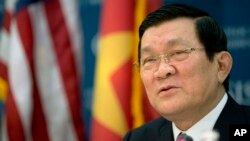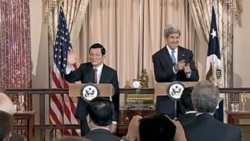WASHINGTON —
Vietnamese President Truong Tan Sang is visiting the United States this week. He met with President Obama at the White House on Thursday.
Analysts say the Vietnamese president’s visit comes at a time when the Southeast Asian country is facing increasing pressure to decide its future. U.S. lawmakers and human rights activists have urged the Obama administration to seize the opportunity to push Vietnam in a more democratic direction.
U.S. Secretary of State John Kerry hosted a working lunch for the visiting Vietnamese president on Wednesday. Kerry sounded a promising note in his speech.
“The Vietnamese have learned from their own history that we all have no permanent enemies, only friends yet to be made,” he said.
Almost four decades after the Vietnam War ended, the Southeast Asian country is increasingly looking at the United States for strategic assurance - in a way ironically to counterbalance its communist “big brother” China.
“When Vietnam feels insecure, who is it going to feel insecure about? Laos? Cambodia? Thailand? The United States is too far away … so China,” said University of Virginia political scientist Brantly Womack, a long-time watcher of U.S-.China-Vietnam relations.
“Now with the Chinese assertiveness in the South China Sea, there’s increasing broadening of the consensus in terms of the perception that China is posing a threat to Vietnam’s sovereignty and territorial integrity," said Alexander Vuving, who is with the Asia-Pacific Center for Security Studies.
For those who wish to see Vietnam transform into a democratic system, tension between Vietnam and China, as well as Vietnam’s increasing reliance on the U.S. for trade and investment, provide a window of opportunity for democratic change in Vietnam.
“One thing that is truly helping right now is the unrelenting aggression from the north, that is, from China," said Dr. Nguyen Dinh Thang, executive director of the Virginia-based civil rights organization Boat People SOS. "Vietnam cannot resist that aggression on its own; it is becoming more and more vulnerable to that. It has to make a decision - either to join with the U.S. and other ASEAN countries to put together a common front to push back the aggression or stay with China."
Many of Vietnam’s neighbors in Southeast Asia are going through socio-political changes that, until recently, were difficult to imagine.
Burma, for decades under military dictatorship, is going through systemic transformation that has been welcomed by the international community. The Burmese leadership is keeping its promise to release all political prisoners by the end of the year, in order to see “all to be able to contribute towards the betterment of the country.” Vietnam’s neighbor, Cambodia, also is holding elections, and its opposition leader has been allowed to return from exile.
Vietnamese leaders are confronted with the fundamental question of which direction the country ought to go, says Vuving.
“Do we want to open up the country? Do we want to be open to the dissidents and opposition and so on and so forth,” he asked.
Observers say reform-minded officials within the Vietnamese government are still in the minority; for changes from within to happen, a push from the outside could make a difference. Many hope Vietnam will see the example of Burma and change.
“Just like Burma, there ought to be some pressure from the outside; that might trigger changes from within the system. We’ve seen a lot of talk and a lot of statements - we appreciate that, but we need concrete actions and a timeline from our own government,” said Dr. Nguyen Dinh Thang.
Analysts say high on Sang’s agenda on his visit to the United States is upgrading the bilateral relationship to a “strategic partnership.”
“One of the diplomatic goals of Vietnam is to establish a strategic partnership with each of the permanent five members of the U.N. Security Council. The United States is the only one left that it doesn’t have a strategic partnership with,” UVA's Womack said.
In a speech he gave on Wednesday, Sang expressed his country’s desire to see a stronger footprint by the United States in the Asia-Pacific region.
“Amidst a changing regional and world landscape, the major powers, including the United States, have an important role and responsibility in dealing with hotspots in the region such as the East Sea - East China Sea,” he said.
Many members of the U.S. Congress have urged the White House to seize the opportunity and enable a change in Vietnam that will benefit its people.
“If Vietnam wants a closer relationship with the United States, then Vietnam should meet this requirement by the United States in exchange. We should use our leverage, ” said House Foreign Affairs Chairman Ed Royce.
“There will never be a matriculation from dictatorship to democracy if we stand with the dictatorship," said Congressman Chris Smith from New Jersey. " So I say ‘meet with presidents like Sang who was not elected by the people as we all know … meet with him, argue with him, but don’t enable him, don’t walk around smiling, having so many photo ops that the plight of the dissidents gets lost.”
How the United States and Vietnam balance human rights, trade and geopolitical considerations will be watched by many in the region, not the least China.
Analysts say the Vietnamese president’s visit comes at a time when the Southeast Asian country is facing increasing pressure to decide its future. U.S. lawmakers and human rights activists have urged the Obama administration to seize the opportunity to push Vietnam in a more democratic direction.
U.S. Secretary of State John Kerry hosted a working lunch for the visiting Vietnamese president on Wednesday. Kerry sounded a promising note in his speech.
“The Vietnamese have learned from their own history that we all have no permanent enemies, only friends yet to be made,” he said.
Almost four decades after the Vietnam War ended, the Southeast Asian country is increasingly looking at the United States for strategic assurance - in a way ironically to counterbalance its communist “big brother” China.
“When Vietnam feels insecure, who is it going to feel insecure about? Laos? Cambodia? Thailand? The United States is too far away … so China,” said University of Virginia political scientist Brantly Womack, a long-time watcher of U.S-.China-Vietnam relations.
“Now with the Chinese assertiveness in the South China Sea, there’s increasing broadening of the consensus in terms of the perception that China is posing a threat to Vietnam’s sovereignty and territorial integrity," said Alexander Vuving, who is with the Asia-Pacific Center for Security Studies.
For those who wish to see Vietnam transform into a democratic system, tension between Vietnam and China, as well as Vietnam’s increasing reliance on the U.S. for trade and investment, provide a window of opportunity for democratic change in Vietnam.
“One thing that is truly helping right now is the unrelenting aggression from the north, that is, from China," said Dr. Nguyen Dinh Thang, executive director of the Virginia-based civil rights organization Boat People SOS. "Vietnam cannot resist that aggression on its own; it is becoming more and more vulnerable to that. It has to make a decision - either to join with the U.S. and other ASEAN countries to put together a common front to push back the aggression or stay with China."
Many of Vietnam’s neighbors in Southeast Asia are going through socio-political changes that, until recently, were difficult to imagine.
Burma, for decades under military dictatorship, is going through systemic transformation that has been welcomed by the international community. The Burmese leadership is keeping its promise to release all political prisoners by the end of the year, in order to see “all to be able to contribute towards the betterment of the country.” Vietnam’s neighbor, Cambodia, also is holding elections, and its opposition leader has been allowed to return from exile.
Vietnamese leaders are confronted with the fundamental question of which direction the country ought to go, says Vuving.
“Do we want to open up the country? Do we want to be open to the dissidents and opposition and so on and so forth,” he asked.
Observers say reform-minded officials within the Vietnamese government are still in the minority; for changes from within to happen, a push from the outside could make a difference. Many hope Vietnam will see the example of Burma and change.
“Just like Burma, there ought to be some pressure from the outside; that might trigger changes from within the system. We’ve seen a lot of talk and a lot of statements - we appreciate that, but we need concrete actions and a timeline from our own government,” said Dr. Nguyen Dinh Thang.
Analysts say high on Sang’s agenda on his visit to the United States is upgrading the bilateral relationship to a “strategic partnership.”
“One of the diplomatic goals of Vietnam is to establish a strategic partnership with each of the permanent five members of the U.N. Security Council. The United States is the only one left that it doesn’t have a strategic partnership with,” UVA's Womack said.
In a speech he gave on Wednesday, Sang expressed his country’s desire to see a stronger footprint by the United States in the Asia-Pacific region.
“Amidst a changing regional and world landscape, the major powers, including the United States, have an important role and responsibility in dealing with hotspots in the region such as the East Sea - East China Sea,” he said.
Many members of the U.S. Congress have urged the White House to seize the opportunity and enable a change in Vietnam that will benefit its people.
“If Vietnam wants a closer relationship with the United States, then Vietnam should meet this requirement by the United States in exchange. We should use our leverage, ” said House Foreign Affairs Chairman Ed Royce.
“There will never be a matriculation from dictatorship to democracy if we stand with the dictatorship," said Congressman Chris Smith from New Jersey. " So I say ‘meet with presidents like Sang who was not elected by the people as we all know … meet with him, argue with him, but don’t enable him, don’t walk around smiling, having so many photo ops that the plight of the dissidents gets lost.”
How the United States and Vietnam balance human rights, trade and geopolitical considerations will be watched by many in the region, not the least China.













